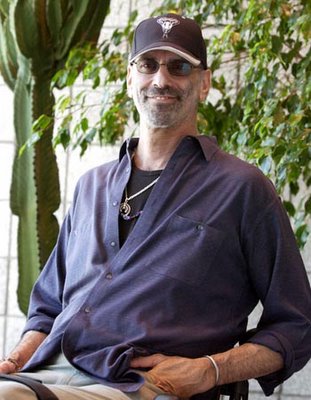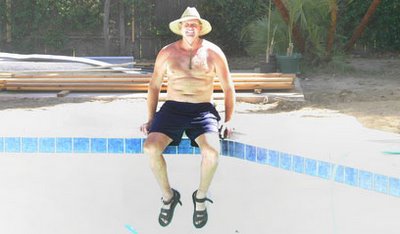Where They Are Today - Corey Gaines
Corey Gaines finished his career in Israel just two years ago. He did it in BC Haifa. After a long successful career in the NBA (played for New Jersey, Philadelphia, Denver and New York), Europe (Scavolini Pesaro, Verona and Galatasaray) and Israel (played for Hapoel Eylat, Maccabi Rishon Le’Zion and Haifa), he seems closer than ever to go back to the best basketball league in the world – this time as a coach. Since announcing his retirement and went back to the USA with his Israeli girlfriend, he having a lot of success as a coach in the ABA league and as a personal trainer for draft candidates.
“I called it a quit as a player at 39, and left Israel back to the US. I got a job offer from Paul Westhead, who coached me in the past in Loyola Marymount (and lead the Los Angeles Lakers for the championships in 1980). He offered me to join me as his assistant coach in the ABA team of Long Beach Jam. I agreed and joined him and the other asst. coach Earl Cuerton, who is a good friend of mine”, says Gaines, “Then, all of a sudden, Westhead got an offer from the Orlando Magic, so I replaced him as head coach”.
“We had great players on our team – DerMarr Johnson, Matt Barnes and the Japanese point guard Yuta Tavusa. After he left, we didn’t have a point guard on the roster, so Earl said: ‘hey, why won’t you be a player coach, and be the playmaker of the team?’. That was a good idea. I was going as the first point guard on the team, but I only managed to play in the first ten minutes. That was enough for us. I was opening the games, and the young players felt more comfortable and we didn’t stopped winning until the finals, where we lost to the Utah Snowbears.
“In my second season in Long Beach, I couldn’t play anymore. I was finished. Although I wasn’t playing, the team continued winning. We did a good job, but couldn’t win the championships. Last summer I got an offer from my agent to work out young players and prepare them to the NBA draft. I worked with Aundrey Blatch (who was picked in the second round by the Washington Wizards) and Greek Kostas Vassiliedis. My job was to prepare them both mentally and physically to their workouts with the NBA teams. This year I’m going to continue with the Jam and hope it will help me get a coaching job in a NBA team – that’s my aim”.
If you ask Gaines who is his role model as a coach, he picks a long honorable list of coaches, among them some surprising names. “I played for Paul Westhead, Pat Riley, George Karl and Valerio Bianchini (who coached Gaines in Pesaro) and I learned a lot from them, but Efi Birenboim and Moysh’le Weinkranz also have a great contribution to my coaching knowledge. Efi is one of the best coaches I ever had. He is a players’ coach, and knows how to relate to them. Efi understands players and that’s the hardest thing for a coach. I liked the Way Moish’le let me do my thing outside the court, when I was playing for him in Eylat. Going to the beach in the mornings and dancing at nights. He had only one demand – that I will give my best on the court, and that what I did”.
Apparently, Gaines came to Eylat as s personal import of Joe Dowson, who still plays on our country’s courts. “after my rookie in New Jersey in 1989, I went to play in Venezuela’s summer league, in Porto La Cruz and met Dowson there, who told me about Israel” Gaines recalls, “Seven years after, Dowson played in Eylat and offered me to join him there. I already had European experience in Italy and Turkey, but I found out that all Joe said was true. The people of the city welcomed me, hugged me and took care of me. We had a good team with Amir Katz, Meir Tapiro and James Forest and we also beat Maccabi Tel Aviv that year. I already beat Maccabi in the past with Scavolini, but I wasn’t so impressed with them back then. In Eylat it was much harder and more exciting to beat Maccabi”.
Since that win, the veteran point guard experienced the taste of win over the Yellows some more times and was close to do it again, five years later as a BC Haifa’s player. That year, Gaines had Birenboim as a coach and Marco Bolic as a shooting guard and Stanley Brundy as center. The team managed to get to the semifinals, where it missed one chance to beat Maccabi in the Playoffs. “We could have surprised them, but I twisted my ankle and we missed it. That was my worst moment in Israel”, claims Gaines.
During his six and a half seasons, the so sufficient point guard learned all about Israeli basketball, and all his sides. Even though he always got a lot of praises and appreciation, he knows it doesn’t worth much without a real team competition in the league. That’s the main problem of Israeli league, in his view. “Everybody knows who will win the championships. That sucks. There is no competition and nothing to fight for. You don’t need to look much to find out what’s wrong with Israeli basketball”. In Europe, Gaines predicts it won’t be so easy for Maccabi to win the Euroleague for the third time in a row, with the removing of the foreign players restriction in Europe. “Now everybody will imitate Maccabi and sign American players. That will cancel Maccabi’s relative advantage in Europe”, Gaines presumes.
- who are the best players you been with in Israel?
“In my life I played two great shooters like Reggie Miller and Antonello Riva and I was lucky enough to have great shooters in Israel. Like Amir Katz in Eylat and Bolic in Haifa. ‘Taz’ (that’s how Gaines calls Tapiro) of those days was a good young player, but it’s not the Tapiro of today. I remember having a tough time against Adi Gordon (Hapoel Jerusalem’s PG) and Lemont Jones (Galil Elyon’s PG), but the best point guards I ever played against outside the US were definitely Alexander Djordjevic and Petr Naumoski”.
Another player, Gaines joined forces with lately was Dennis Rodman. He did it as a coach in his first year with Long Beach, where Rodman decided to try his Comeback in 2003. Gaines claims Rodman was not a problematic player, surprising as it sounds.
“People has a certain opinion about him. He have a public image that was probably correct at the time, but now he clamed down completely. Doesn’t drink, doesn’t smoke. I remember going out with him a couple of times. We went to his club in Newport Beach and it was very nice”, says Gaines. “As a player, he always worked hard, listened to all he was told and gave it all for the team. He was sure that he can go back and play in the NBA at the age of 42 and physically he could have done it, if his knees didn’t start to hurt. Since then he keeps himself busy with all kinds of businesses that are not related to basketball. Part of it is because he is getting bored pretty fast”.
- have you ever talked about Israel?




 Put a side the not so convenient recollection of Israel's everyday life, Walk don’t have too good memories of Israeli basketball and don’t get too excited from the last two European championships of Maccabi. “How many American players plays now in Maccabi? (5 as for 2005). It’s always been the same strategy for Maccabi. They were getting citizenship for their foreign players, like Aulcey Perry and Earl Williams, and that’s why no one can beat them. Well…You can understand them. You can’t say Israelis were such good basketball players. In Ramat Gan we had me and Charlie Davis, Steve Kaplan, Steve Schlachter, Or Goren, Avigdor Moskovic, Yehuda Levy and some Kibbutznik’s and soldiers”.
Put a side the not so convenient recollection of Israel's everyday life, Walk don’t have too good memories of Israeli basketball and don’t get too excited from the last two European championships of Maccabi. “How many American players plays now in Maccabi? (5 as for 2005). It’s always been the same strategy for Maccabi. They were getting citizenship for their foreign players, like Aulcey Perry and Earl Williams, and that’s why no one can beat them. Well…You can understand them. You can’t say Israelis were such good basketball players. In Ramat Gan we had me and Charlie Davis, Steve Kaplan, Steve Schlachter, Or Goren, Avigdor Moskovic, Yehuda Levy and some Kibbutznik’s and soldiers”.
